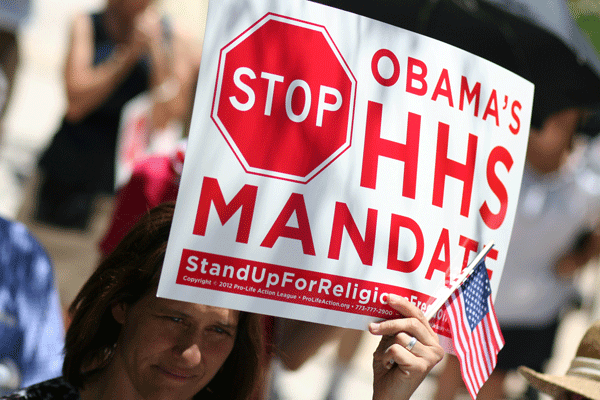
CHARLOTTE, N.C. (CNS) — A federal judge has dismissed Belmont Abbey College's lawsuit against the Obama administration that had challenged the federal contraception mandate, but lawyers for the Benedictine college in Belmont say they will continue the fight.
U.S. District Judge James E. Boasberg of the District of Columbia dismissed Belmont Abbey's case July 18, saying that the college did not have standing to bring the case to court, nor could it demonstrate it had been harmed yet by the contraception mandate.
The contraception mandate — issued in August 2011 by the federal Department of Health and Human Services as part of the 2010 Patient Protection and Affordable Care Act — requires nearly all employers to provide free artificial contraception, sterilization and abortion-causing drugs coverage in their insurance plans.
There is a narrow exemption for employers who object to providing these services on religious grounds, namely if they serve or hire people primarily of their own faith.
The contraceptive mandate takes effect for new health plans and those that undergo significant changes Aug. 1, 2012 — unless the narrow religious exemption applies or a one-year “temporary enforcement safe harbor” applies.
Following an outcry over the contraceptive mandate from Catholic institutions across the country and the U.S. bishops this past spring, the Obama administration established the “safe harbor” period to allow those employers that do not provide contraceptives for religious reasons time to figure out how they will comply with the mandate. The “safe harbor” period expires Aug. 1, 2013.
The mandate requiring individuals to get health insurance or face fines goes into effect Jan. 1, 2014.
The Becket Fund for Religious Liberty, a nonprofit law firm representing Belmont Abbey College in the lawsuit, argued that paying for contraceptive services for employees and students would force the Catholic college and Benedictine monastic community to violate Church teaching against artificial contraception.
The firm argued that the mandate would mean an unconstitutional infringement of their First Amendment right to free exercise of religion and that Belmont Abbey College said it believed it would not be exempted from the mandate's requirements.
Boasberg agreed with the Department of Justice's position that Belmont Abbey's case was premature and that more time is needed to see if the government would modify the contraception mandate and further accommodate the concerns of religious employers, which federal officials have promised they would do.
“The court holds that the challenged rule is not 'sufficiently final,'” Boasberg said in his opinion. “The government has done nothing to suggest that it might abandon its efforts to modify the rule – indeed, it has steadily pursued that course – and it is entitled to a presumption that it acts in good faith.”
The court did not consider the merits of Belmont Abbey's case, and Belmont Abbey may re-file its lawsuit if and when it can demonstrate harm caused by the mandate.
“At the end of the day, the Court offers no opinion on the merits of the current contraception-coverage regulations or any proposed future ones. If Plaintiff is displeased by the ultimate regulations, it may certainly renew its suit at that time. All the Court holds here is that Belmont has no basis to proceed now,” said Boasberg in his 24-page opinion.
Belmont Abbey College's case was the first to be filed challenging the HHS mandate last November. The liberal arts college has been run by the Benedictine monks of Belmont Abbey since 1876.
The Becket Fund is representing clients — including other religious colleges, EWTN and Priests for Life — in some of the 22 other similar lawsuits filed in federal district courts around the U.S.
Hannah Smith, senior counsel for the Becket Fund, said in a statement that the decision in Belmont Abbey College's case “was on technical grounds: The judge thinks that the case should be delayed for a matter of months to give HHS time to fix the mandate.”
“The decision says nothing about the merits of Belmont Abbey's religious freedom claims, and has no effect on any of the 22 other cases currently pending in federal court,” she said. “It simply delays Belmont Abbey College's ability to challenge the mandate for a few months, and the court made clear we have the right to re-file the case if HHS does not fix the problem.”
Smith said the law firm was “reviewing the decision and considering our options, but one thing is clear: Belmont Abbey College and the Becket Fund will continue the fight for religious liberty, even if this case is delayed for a few months.”
– – –
By Patricia L. Guilfoyle, editor of The Catholic News & Herald, newspaper of the Charlotte Diocese.






